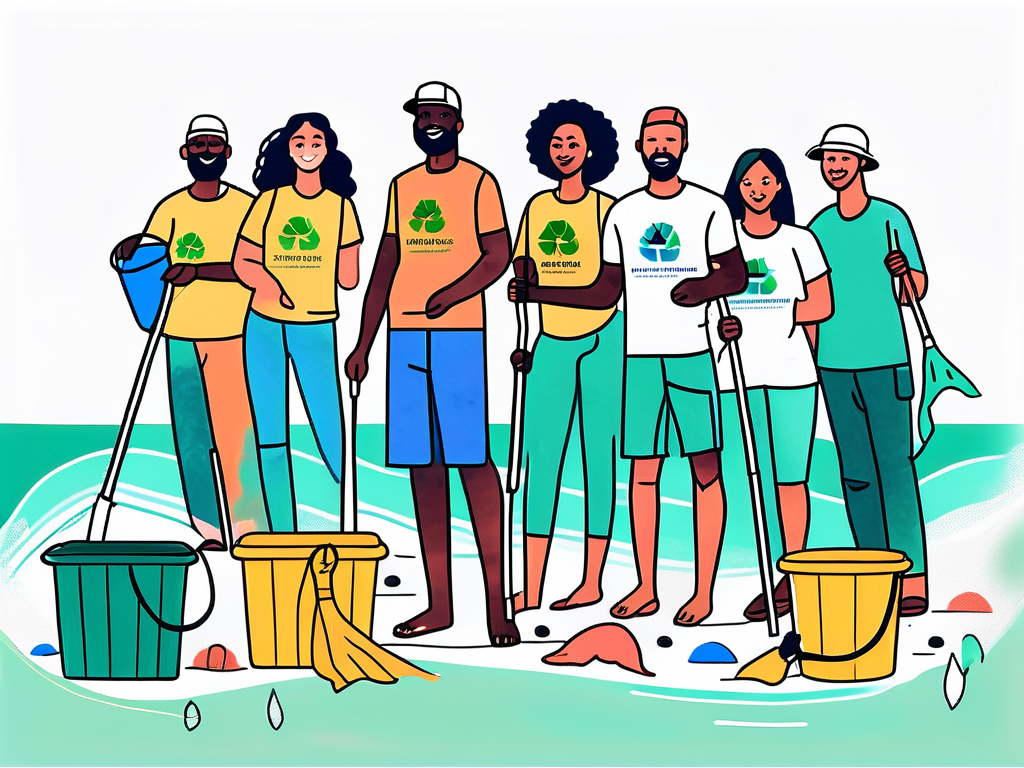Plastic pollution in our oceans has become a major global concern. It not only harms marine life but also poses a threat to human health. Fortunately, there are several effective ways we can combat this issue and help restore the health of our oceans. In this article, we will explore five strategies that can make a significant difference.
Taking Action Against Plastic Pollution
Simple Swaps for Eco-Friendly Laundry Practices
One way to combat plastic pollution is by making simple swaps in our daily routines. One area where we can make a significant impact is in our laundry practices. By opting for eco-friendly laundry detergents packaged in biodegradable materials, we can reduce the amount of plastic waste released into our oceans.

But let's dive deeper into the world of eco-friendly laundry practices. Did you know that some laundry detergents labeled as "eco-friendly" may still contain harmful chemicals? That's why it's important to look for certifications such as the Environmental Protection Agency's Safer Choice label, which ensures that the product is safer for both the environment and our health.
Additionally, using reusable dryer balls instead of single-use dryer sheets can further reduce plastic waste. Not only do dryer balls help to soften clothes and reduce drying time, but they also eliminate the need for chemical-laden fabric softeners. By making this simple change, we can take a step towards a more sustainable laundry routine.
Opting for Minimal Packaging: A Greener Choice
Another effective way to combat plastic pollution is by supporting products with minimal packaging. When we choose products that are packaged in eco-friendly materials or come in bulk, we significantly reduce the amount of plastic waste generated.
But let's take a moment to appreciate the innovative companies that are going above and beyond to reduce packaging waste. Some brands are now offering laundry detergents in concentrated forms, which require smaller packaging and less transportation energy. This not only reduces plastic waste but also minimizes the carbon footprint associated with transportation.
Furthermore, opting for products with reusable or refillable packaging options can greatly contribute to reducing plastic pollution. Imagine being able to refill your laundry detergent bottle instead of buying a new one every time. Not only does this save money in the long run, but it also helps to keep plastic out of our oceans and landfills.
The Importance of Proper Recycling Habits
Proper recycling habits are crucial in combating plastic pollution. By ensuring that we correctly sort and recycle plastic waste in our homes and communities, we prevent it from ending up in landfills or finding its way into our oceans.
But did you know that not all plastics are created equal when it comes to recycling? Different types of plastics have different recycling capabilities, and it's important to understand which ones can be recycled in your area. For example, some communities may only accept plastic bottles, while others may have the infrastructure to recycle a wider range of plastics.
It is essential to familiarize ourselves with local recycling guidelines and educate others on the importance of recycling. By doing so, we can help create a culture of responsible waste management and contribute to the reduction of plastic pollution in our oceans.
So, let's continue to make these simple swaps in our laundry practices, choose products with minimal packaging, and embrace proper recycling habits. Together, we can make a significant difference in the fight against plastic pollution and ensure a cleaner and healthier future for our oceans.
Engaging in Community-Led Environmental Initiatives
How Grassroots Movements Can Make a Big Impact
Grassroots movements play a vital role in combatting plastic pollution. By joining or supporting local organizations or initiatives that focus on raising awareness about plastic pollution, we become part of a larger collective effort to protect our oceans.

These movements often organize beach clean-ups, educational programs, and advocacy campaigns that aim to bring about change at the community level. By actively participating in or supporting these initiatives, we contribute to the larger goal of reducing plastic pollution and preserving marine ecosystems.
Imagine waking up on a sunny Saturday morning, feeling the refreshing ocean breeze on your face as you head to a local beach clean-up organized by a grassroots movement. As you arrive, you are greeted by a diverse group of passionate individuals, all united by their love for the ocean and their determination to make a difference. Armed with gloves and trash bags, you spend the morning combing the shoreline, picking up plastic debris that would otherwise harm marine life.
But the impact of grassroots movements goes beyond the physical cleanup. These initiatives also focus on education and awareness. Picture yourself attending an educational program organized by a local organization. Expert speakers share their knowledge about the devastating effects of plastic pollution on marine ecosystems, leaving you inspired and motivated to take action. Armed with this newfound knowledge, you become an advocate within your own community, spreading awareness and encouraging others to join the cause.
Empowering Yourself Through Environmental Education
An empowered individual has the potential to create significant change. Educating ourselves about the impact of plastic pollution on our oceans is crucial for driving personal and collective action.
By staying informed about the latest research and developments, we can make informed choices in our daily lives that reduce our plastic footprint. Sharing this knowledge with others enables us to inspire greater awareness and action within our communities.
Imagine attending a workshop on sustainable living, where you learn practical tips on reducing plastic waste. You discover innovative alternatives to single-use plastics and find inspiration in the success stories of individuals who have made significant changes in their lifestyles. Armed with this knowledge, you embark on a journey to minimize your plastic consumption, influencing those around you to do the same.
But the power of environmental education extends beyond our personal choices. It empowers us to engage in meaningful conversations with friends, family, and even strangers, sparking a ripple effect of change. By sharing our knowledge and experiences, we inspire others to rethink their habits and make more sustainable choices, creating a collective impact that reaches far beyond our immediate circles.
Advocating for Policy Changes to Combat Plastic Pollution
In addition to individual actions, advocating for policy changes is essential for combatting plastic pollution on a larger scale. By raising our voices and engaging with policymakers, we can push for regulations that promote sustainable practices and reduce plastic waste.
Supporting organizations and signing petitions that champion initiatives such as plastic bans or extended producer responsibility can have a significant impact. By uniting our efforts, we can influence policy decisions that contribute to a cleaner and healthier ocean environment.
Imagine attending a town hall meeting where community members, activists, and policymakers come together to discuss the urgent need for stronger regulations on plastic waste. As you voice your concerns and share your experiences, you witness the power of collective action. The policymakers listen attentively, realizing the magnitude of the problem and the support behind finding sustainable solutions. Your voice, combined with others, becomes a catalyst for change.
But advocacy doesn't stop at town hall meetings. It extends to online platforms, where you can sign petitions and support organizations that are fighting for policy changes. By leveraging the power of social media and digital activism, you amplify your voice and reach a wider audience, creating a groundswell of support that cannot be ignored.
Conclusion
The battle against plastic pollution in our oceans requires collective action and a commitment to sustainable practices. By implementing these five strategies - making eco-friendly laundry swaps, supporting minimal packaging, practicing proper recycling habits, engaging in community-led initiatives, and advocating for policy changes - we can contribute to the preservation of marine ecosystems and ensure a healthier future for our oceans.







